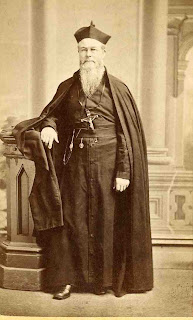Today marks the birth of the first Native American priest, Father James Chrysyostom Bouchard (1823-1889). The following is taken from the Jesuit’s California Province website and is written by Father Gerald McKevitt, S.J.:
“The number of people that come to our church is incredible,” an Italian Jesuit wrote from San Francisco in 1862. “Last Sunday more than a thousand people left because they could not find a seat.” The packed pews of St. Ignatius Church testified not only to Christian piety, but also to the high priority nineteenth-century congregations placed on pulpit performance. As a visiting European priest once observed, “One thing is certain, the Americans will always go where the preaching is best.” Every Sunday, stirring rhetoric drew standing-room-only crowds of Protestants as well as Catholics eager to hear sermons of great length that were reprinted in the city’s newspapers. Of Michele Accolti, a contemporary once said, “It was enough to know that he was preaching and the church was filled with Protestants.” The Italian priests, however, were by their own admission “not very good preachers” in English, which impelled them to import helpers who were.
None of the recruits was more effective than James Bouchard. In 1861, the arrival in San Francisco of this famed Jesuit preacher and lecturer mapped a turning point in the fortunes of the Society of Jesus. Much of the respect subsequently enjoyed by Jesuits in California was due in no small part to Bouchard’s eloquence. Son of a Delaware Indian chief and a French woman raised by the Comanche, Bouchard was the first Native American ordained a Roman Catholic priest in the United States. An orator of premier rank who held forth in the baroque style of his era, as preacher, lecturer, and controversialist, he had no equal in California. For three decades, audiences listened in openmouthed amazement to the eloquent Indian, charmed “by the sound of his silvery voice, by the power of his nervous eloquence,” a contemporary said. They were “wild to have a preacher like him.”
None of the recruits was more effective than James Bouchard. In 1861, the arrival in San Francisco of this famed Jesuit preacher and lecturer mapped a turning point in the fortunes of the Society of Jesus. Much of the respect subsequently enjoyed by Jesuits in California was due in no small part to Bouchard’s eloquence. Son of a Delaware Indian chief and a French woman raised by the Comanche, Bouchard was the first Native American ordained a Roman Catholic priest in the United States. An orator of premier rank who held forth in the baroque style of his era, as preacher, lecturer, and controversialist, he had no equal in California. For three decades, audiences listened in openmouthed amazement to the eloquent Indian, charmed “by the sound of his silvery voice, by the power of his nervous eloquence,” a contemporary said. They were “wild to have a preacher like him.”
Bouchard’s oratory was not limited, however, to sermons in San Francisco. Much of his popularity was traceable to the public lectures on controversial subjects of the day that he delivered throughout the length and breadth of the West. “If variety is spice, then Sacramento was strongly seasoned,” a local newspaper recorded when Bouchard spoke on religion in that city in 1876.
The Jesuit was equally famous for the parochial missions he preached to congregations up and down the West Coast. Comparable to the Protestant revival meeting, the mission aimed at recovering lost sheep, converting sinners, and strengthening the local church. It achieved those objectives by intense and dramatic preaching and by increased reception of the sacraments. In the course of nearly thirty years, Bouchard preached missions in countless towns and mining camps on the Pacific Coast. At his funeral in 1889, Archbishop Patrick Riordan of San Francisco summed up his unusual career: “To no man in all the West is the Church of God more beholden than to Father James Bouchard.”












